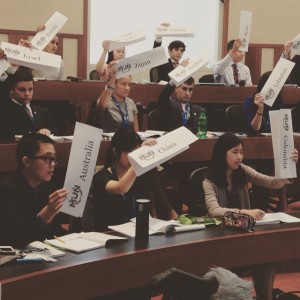
MUN Rules of Procedure exist to facilitate debate, not hinder it. However, there are many ways you can use the Rules of Procedure to move the committee in the right direction, gain opportunities to speak, or help serve the needs of your Member States. However, keep in mind that procedures and how they’re carried out vary by conference, so these strategies aren’t guaranteed to work at every conference.
Precedence of Motions
“Precedence” describes what motions will be voted on first when there are competing motions. With most motions, precedence won’t make a big difference- you will rarely be trying to Open Debate, Open the Speakers’ List, Close the Speakers’ List, or Adjourn while there are other motions to consider. However, there are two key instances when precedence of motions matters.
- A Motion to Close Debate will be voted upon before anything except for adjournment. This means that if you want to move into Voting Procedure and other delegates want to keep discussing a topic, your Motion to Close Debate will be voted on first! (Requires a ⅔ vote)
- Unmoderated Caucuses are voted on before Moderated Caucuses, and Moderated Caucuses are voted on based on which motion is for the most time. So, a 1 minute unmoderated will be voted on before a 5-minute moderated, and an 11 minute moderated will be voted on before a 10 minute moderated. This can be used to get your motion voted on first (usually the person that moved for a moderated caucus gets to deliver the first speech).
Rights of Reply
At many conferences, if you feel that you have been personally attacked or your country has been unfairly insulted in debate, you can send a note to the Dais to request a Right of Reply. A Right of Reply enables you to deliver a speech on why your country is offended and why the statements are inaccurate, and can be a great way to show off your speaking ability and procedural knowledge.
Quorum Check
If you’re in a Security Council committee, and you want to try to trick your way into avoiding a veto by a P5 nation, you can try to get the veto power you’re worried about to leave the room and then move to Close Debate. Nobody can enter the room during Voting, so they’ll be unable to veto. Note: You can’t do this if they responded Present and Voting, because a vote can only take place with them present.
Motions to comment
If a delegate forgets to “yield their time” at the end of their speech, you can raise a “motion to comment”, to deliver a remarks on the speech that was just delivered, no matter where you are on the Speaker’s List.
Types of Yields
Though you may be used to saying “I yield my time to the Chair”, you have two other options- you can yield to another delegate, or yield to questions. Try yielding to questions after you present an especially innovative idea, or yielding to another delegate if you need somebody to back up your point and know that they’re on board.


